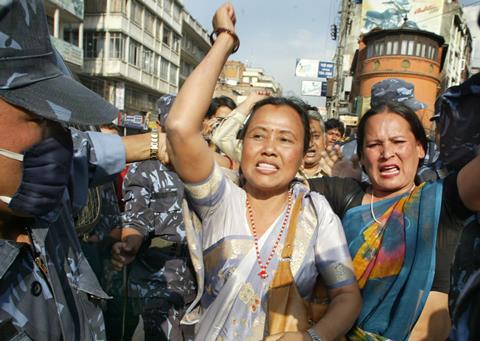Here, Anna Townsend, director of charity Women Without Roofs explains why Nepali women take marking the day dedicated to women very seriously.

My guess is that most people reading this are not planning to celebrate International Women’s Day (IWD) today. It’s one of those United Nations days that pass by without making much of a stir in the UK. Yet, it’s a big deal for women in Asia. In Nepal, where I run the charity Women Without Roofs (WWR), the Social Welfare Council monitors our activities and insists we must mark the day appropriately. They even check up on us!
IWD is often a fun day with plenty of food. When I tell our ladies that it isn’t celebrated where I’m from, they tell me we are missing out. As Christians, IWD is an opportunity to celebrate the contributions made by women in our churches and communities. It’s also a chance to learn more about the plight of women worldwide, who face many more difficulties than us.
So why do women in Asia make such a fuss about International Women’s Day? Well, they lag far behind us regarding women’s rights (even though we may feel there is some way to go before full equality is achieved in the UK). They are longing for change. By celebrating IWD, participants encourage those still struggling for fundamental rights, highlight the issues they face and celebrate the progress that has been made.
In Nepal they lag far behind us regarding women’s rights and they are longing for change.
Let me tell you about Lila, whose story I relay in full in the first chapter of my book Come With Me to Kathmandu. She developed leprosy symptoms as a teenager, but before she could be tested and treated, she had to provide her husband’s name. He wouldn’t accompany her to the hospital due to the stigma of leprosy, and thanks to a superstitious fear of naming someone aloud, she didn’t know his name. Thankfully, God stepped in and miraculously provided a solution. Since this incident, rules have changed, and a woman can now access healthcare in Nepal using only her name, so on IWD, we can celebrate this!
Other women WWR helps are still facing battles with patriarchy. In the late 1990s, Nepal’s government enacted a law so that women could obtain citizenship themselves. A woman’s word and guarantee were, under the law, considered good enough. Yet, in practice, many Nepali women have been unable to get citizenship. Without a man present, self-important bureaucrats tell our women to go away and return with a male family member. This is impossible for many of our women. Some were abandoned as children, many of their fathers have died, and countless others are married to men who have disappeared without a trace.
Many Nepali women have been unable to get citizenship, without a man present they are told to go away.
The worst impact of the failure to allow women to obtain citizenship falls on the next generation. The children of our women are hugely disadvantaged without proper documentation. Any job within the public sector (Nepal’s largest employer) requires citizenship, and obtaining a passport to work elsewhere becomes impossible. Knowing that no matter how much you work and save, your children will never be able to own property is deeply discouraging. In short, without citizenship, it is almost impossible to break the cycle of poverty.
So on IWD 2023, let’s thank God for the incredible women we know and praise him for the progress that has been made. Why not mark the day with a celebration? While you do this, may I also ask you to remember and pray for Asian women who still encounter many obstacles to their flourishing.
If you’d like to know more about how best to pray for women in Nepal, please read my book Come With Me to Kathmandu: 12 powerful stories of women’s courageous faith in Nepal.
































No comments yet